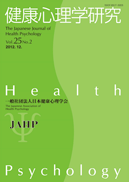All issues

Successor
Volume 8 (1995)
- Issue 2 Pages 1-
- Issue 1 Pages 1-
Volume 8, Issue 2
Displaying 1-4 of 4 articles from this issue
- |<
- <
- 1
- >
- >|
-
Yoshiharu Fukuoka, Tsukasa Hashimoto1995Volume 8Issue 2 Pages 1-11
Published: 1995
Released on J-STAGE: June 13, 2015
JOURNAL FREE ACCESSThis study investigated the differences of stress-buffering effects of perceived social support (measured as the perceived availability of supportive behaviors), depending on the sources (family members, friends, co-workers) and the contents (comfort/encouragement (emotional support), advice/guidance, material and financial support, behavioral support). The questionnaire data of 41 nurses were analysed. The main results showed that emotional support from family alleviated the aversive effect of daily hassles on overall psychological health (measured by 28-item General Health Questionnaire), and advice/guidance from friends also had moderating effect. Advice/guidance from co-workers had main and buffering effects, especially on “social dysfunction”. These are able to be interpreted in terms of the functions of such relationships for the support recipients, and suggest the importance of further examination about the role of different contents of social supports from various sources in the stress-coping processes, particularly in the contexts of specific stressors.View full abstractDownload PDF (1597K) -
Kayo Tonan, Akihito Sonoda, Yutaka Ono1995Volume 8Issue 2 Pages 12-19
Published: 1995
Released on J-STAGE: June 13, 2015
JOURNAL FREE ACCESSThe purpose of the present study was that the Subjective Well-being Inventory (SUBI) which produced by Sell et al. (1992) was translated into Japanese and confirmed its reliability and validity. The questionnaire was administered for 229 subjects. The results of its factor analysis indicated that the scale had composed with 7 subscales: (1) General happiness, (2) Upsetability, (3) Social support, (4) Physical illhealth, (5) Family group support, (6) Deficiency in social contacts, (7) Confidence in coping. Five subscales except “Physical ill-health” and “Confidence in coping” had a higher coefficient of reliability.
The “General happiness” and “Confidence in coping” had positive correlation with positive affects that measured by Profile of Mood States (POMS). The “Upsetability” and “Physical ill-health” had positive correlation with negative affects. New patients of psychoneurotic had lower perception of happiness and coping than the normal subjects.View full abstractDownload PDF (1201K) -
Shinya Masuda1995Volume 8Issue 2 Pages 20-29
Published: 1995
Released on J-STAGE: June 13, 2015
JOURNAL FREE ACCESSIn the present study, burnout phenomena among human service professionals working for the elderly at home were examined. It was hypothesized that ambiguous situations were causal factors of burnout, which lowered one's job satisfaction. A covariance structure analysis revealed that burnout was significantly determined by disagreement of communication, ignorance of coping with the problem and clearness of the work plan as well as assignment. Added to this, some factors such as administrative support, autonomy of work and the participation in decision making decreased the burnout symptoms in particular situations. The discussion focused on the meaning of social support for the employees of human services.View full abstractDownload PDF (1541K)
-
Recent Trends and Future ProblemsKoichiro Oka, Koji Takenaka, Masahisa Kodama1995Volume 8Issue 2 Pages 30-43
Published: 1995
Released on J-STAGE: June 13, 2015
JOURNAL FREE ACCESSIncreased participation in sports has been shown to have a positive linear relationship with athletic injuries. Recent studies conducted by health and sport psychologists have suggested that injured athletes may experience mood disturbances and lowered self-esteem. The purpose of this paper is to survey the existing literature which has examined the psychological effects of athletic injury, to explore recent trends, and to discuss where this type of research is heading in the future. Firstly, athletic injury is discussed as a stress factor which may bring about changes in psychological responses.This topic is discussed by comparing two studies which respectivery employ cross-sectional and longitudinal research designs. In the next section, stage and cognitive-appraisal models of psychological response and change due to athletic injury are presented, and studies employing these models are reviewed. It is been shown that cognitive-appraisal models may be more suitable for explaining the psychological change in injured athletes than stage models. Finally, methodological issues surrounding research of this nature are discussed, and ideas for future psychological studies of athletic injury, such as psychological intervention for injured athletes,are examined.View full abstractDownload PDF (2548K)
- |<
- <
- 1
- >
- >|